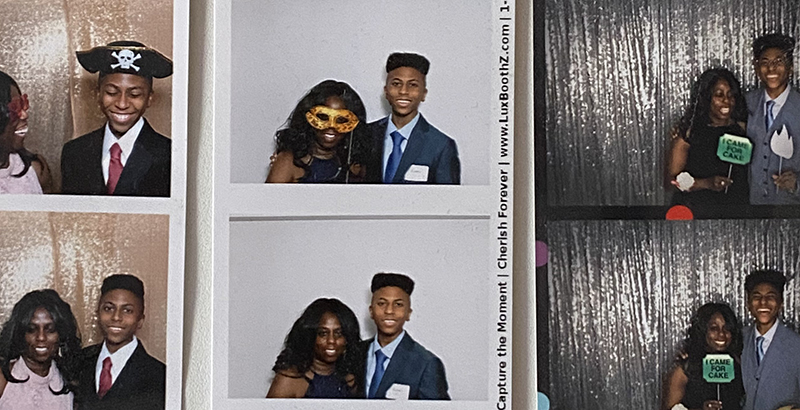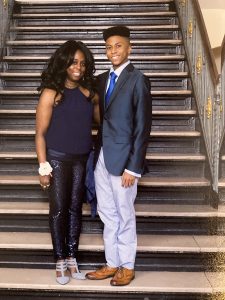My Mom Is 55, Black, and Just Returned to Work in a Doctor’s Office in New York City. That’s Why I’m Scared

My quarantine boredom is turning to anxiety as states begin reopening after months of pandemic-related lockdowns. Closer to home, my mother returned to the front lines on May 28. She is the practice manager of a pediatrician’s office in Manhattan, New York City, one of the hardest-hit COVID-19 hot spots in the world. She is also 55 years old and African-American.
Her job entails engaging face-to-face with dozens of sick patients a day, including drawing blood and collecting urine samples. This puts her at a higher risk of exposure just based on the nature of her work. When you couple this with her race and age, there is cause for me to worry about her safety. I’ve been dealing with the added anxiety largely by reading (I’ve returned to the Percy Jackson series for pure escapism), journaling, and leaning on my friends more than ever through FaceTime, Zoom and text.
I’m very close with my mother and always feel comfortable telling her how I feel. When I was in the seventh grade and kids at my school called me the n-word, she told me to be proud of it and that their words would only affect me as long as I let them.
But she never shows her personal worries to me, and she always goes the extra mile to make me and the rest of the family feel comfortable. When she comes home every night, no matter how tired she is, she makes us authentic Jamaican food: plantains, ackee, rice and peas. It helps connect us to our roots.
We live in South Ozone Park in Queens, a suburban, middle-class and largely African-American neighborhood. My father, who does administrative work at a Midtown financial company from home, is doing the yard enhancement he has never had the time for in the past. My brother, a healthcare lawyer at a Manhattan firm, also lives at home, where he dedicates his time to legal work such as writing and handling contracts. (My sister, a rising senior at Yale, remains at her apartment in New Haven.)
My mother? She’s always been resilient and very stubborn, something that fills me with admiration and also frustration. I told her that I’m worried that she will contract coronavirus and have to be quarantined away from home for a while. She assured me that isn’t going to happen, and if it did, we could still be connected, even if it means making daily video calls. She understands my worries and usually responds by telling me about her duty as a front-line worker and how proud she is and how she will be sure to stay safe.
Despite the comfort I may feel in those moments, the statistics offer cause for concern. Figures from the New York State Department of Health show that despite making up 22 percent of the population, Black people account for 28 percent of COVID-19 fatalities in the state. Racial disparities in coronavirus mortality rates were largely expected, but the numbers are still disconcerting. New results from the APM Research Lab show African Americans nationally dying at more than twice the rate of white people. More than 20,000 Black people — about 1 in every 2,000 — have died from the disease. While Blacks had a fatality rate of 50.3 per 100,000 people, whites had a fatality rate of 20.7 per 100,000.

My friends have been reaching out to me because they know my family and I are at increased risk. They ask me simple things out of the blue, like “How are you?” and “Is your family OK?” It’s simple gestures like this that remind me how lucky I am to have the people around me that I do. The stark statistical disparities, however, come as no surprise to me. They are the result of years of systemic inequalities in our nation’s health care system, prominently brought to the public’s attention by the Institute of Medicine’s seminal 2003 report “Unequal Treatment,” published the year I was born. Since then, these disparities have been acknowledged but largely unaddressed.
Dr. Anthony Fauci, the director of the National Institute of Allergy and Infectious Diseases and one of the most visible leaders in the fight against COVID-19, acknowledged that “health disparities have always existed for the African-American community” and that this crisis is just “shining a bright light on how unacceptable that is.” While his recognition of this fact is great, the stark racial breakdown in the coronavirus death toll demonstrates that not enough has been done to fix these disparities.
Figures from the New York Department of Health show that 9.6 percent of the coronavirus fatalities in the state were people in the 50-59 age range, which my mother falls in, accounting for more than 2,000 deaths. While the gravity of this crisis is a reality for families like mine, many young people glamorize breaking social distancing guidelines because they feel it is so critical to see their friends. I see Snapchat stories and Instagram posts with captions like “Fuck quarantine” that make it seem as if just because some people are bored of coronavirus, it’s over now.
In the same vein, crowds of largely white protesters have taken to the streets to protest the lockdowns. These protests make me very angry. For some people, it seems, economic prosperity is more important than public health. They’re disregarding the fact that there is an entire group of people in this country disproportionately harmed by their actions.
More than 70 percent of New York state has ended lockdowns. Although the city is just beginning to open back up to certain types of businesses, movement in and around it will likely spread the virus. I am happy for the state that the reopening process has begun, but it still doesn’t mitigate the anxiety I feel for my mother.
Before school finished Friday, I’d wake up at 7:30 a.m. to log on to Zoom for my classes and would barely have time to say goodbye to my mother before my father drove her to work. I tried to focus on school, even with distractions like television and video game systems two feet away. With summer and the promise of continued lockdown, the job of staying grounded is made harder when each day, I don’t know if I’ll get a call from my mother saying she has to self-quarantine and might not come home for weeks.
Rainier Harris is a junior at Regis High School, a Catholic school in New York City.
“Pandemic Notebook” is an ongoing collection of first-person, student-written articles about what it is like to live through the coronavirus pandemic. Have an idea? Please contact Executive Editor Andrew Brownstein at Andrew@The74million.org.
Help fund stories like this. Donate now!

;)